Ellen and Jim Have a Blog, Too
We are two part-time academics. Ellen teaches in the English department and Jim in the IT program at George Mason University.


The Poetry of Movies: costume drama · 7 June 07
Dear Marianne,
I put Hollander’s poem on Wompo, a list made up of mostly women poets and about poetry (by women especially), and the people over there were very generous in citing titles of poems, texts (some they had written) and an anthology.
Still, I find revealing and a bit disappointing (if you go over and look), that the poems celebrate impulses we are supposedly not allowed to have (amoral, aggressive, angry) and a number are very much into macho (male) kinds of feelings (for example, a poem on femme fatales). What this uncovers is such feelings are in fact acceptable and often admired; we have violent movies abusive of women (or powerless people) and dismissive of sensitivity and moral views because that’s what people will revel in. On the other hand, the writers do tell. While in Hollander’s poem he acknowledges movies are a dream-machine of deep longings and desires made plain, alluring glamor and so on, he does not give away what he longed for or dreamed himself enacting. (To be fair, perhaps I don’t see that because I don’t recognize most of the stars Hollander names. The one name that conjures up a presense is Butterfly McQueen; and, unless I’m misremembering, she was the young black woman who had the thankless part in the 1939 Gone with the Wind of the cowardly lying Prissy: she is remembered for the famous scene where after claiming she can act as a midwife during Melanie’s childbirth, Prissy suddenly wails in high pitched grating syllabic sounds: “But I don’t know nuffink ‘bout birthin’, Miss Scarlett!”)
Nothing on living in the past, costume drama, and the sort of feelings characteristic of a woman’s film—as described in Home Is Where the Heart Is, ed. Gledhill, and Imitation of Life (two volumes of excellent essays defending romantic melodrama and comedy), ed. Landy. In her book A Women’s View of the movies, Jeanine Basinger (this is the one we voted to read together on WW), Basinger says movies were central to her growing up and learning about life since it was in movies she saw made plain and even discussed what was never mentioned and kept part of the many hidden-in-plain-sight secrets central to life all around her. In one of the books I have on the Austen films, the author says films bring into the openly discussable “choices, acceptances, assumptions, and distortions that are commonly undisclosed” within private reading.
Judy sent me one that approaches what the recent paratextual cartoon openings of the stirring romance of the Lord Peter films (as acted by Harriet Walter and Edward Petherbridge) were redolent of. I have two stills from the latter:
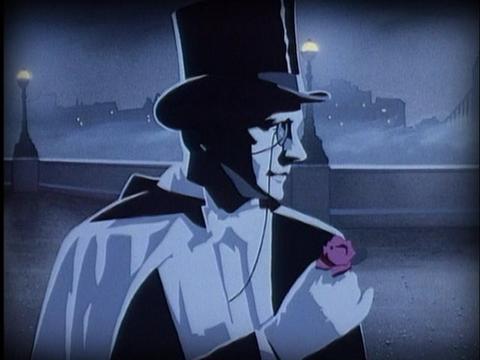
Silent Movie Poem
by Peter Faulkner
Rain pours down the grey street
A mile away the park getting soaked:
limp trees, leaves becoming heavier.
..
You are in your room framed by the window
yellow light blurred by streaks of grey.
Screens of thin, late
summer rain turn our street
into a movie set. Black taxis hurry
delayed teatime drinkers home
and worried grey men like cheap detectives
splash across oily pavements.
It’s all a film: Little guys in overalls
erect cut-out skyscrapers in front of
metalgrey clouds. A city of extras gets to work.
The spiral-bound scripts have been distributed.
Everyone has their role
and you’re the white-faced, black-eyed star
giftwrapped in furs by the waiting Pierce Arrow
and I’m the failed director
distraught beside the unstained casting couch.
Dusk crawls down
The sun is folded in cellophane
like a rose held by a callboy
who didn’t get asked
to the big opening night.
Judy wrote: “it has the downbeat, grey feeling of some of the old movies I’ve been watching lately. I’m not sure what or who a Pierce Arrow is, though. I’d love to find a poem which does create the mood of some of the costume dramas and more opulent old films.”
Pierce Arrow was a luxury car made in the US between 1903 and 1927. For all I know that could be a cartoon image of a Pierce Arrow, except since the movie is English, it’s probably not.
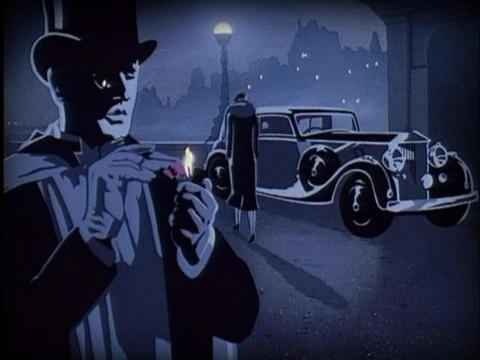
I come from the generation where I can remember when on TV no movie made after 1948 was to be seen, so I spent years growing up where I watched old movies on Channel 9 (this was a NYC channel which at the time would show the same film five days a week and all day Saturday and Sunday), and at age 13 my hero was Ronald Colman and favorite heroine Jean Arthur. I still have a fond spot in my heart for Talk of the Town, as I’ve said here before (and wrote a blog celebrating it); I also still love Bringing Up Baby (Katherine Hepburn and Cary Grant).
For myself I think I nowadays like costume drama especially when adaptations of “great” novels (20th as well as 19th century) with a heroine at the center. Pam Cook has written a wonderful book, Fashioning the Nation defending these, and there is a growing body of book analyzing and defending women’s films and costume and romantic melodrama and comedies , once and still often despised as woman’s fare, soap operas, somehow beneath contempt. Now I identify with the traditional heroines of these (as I recall sneered at by Nabokov in his essay on Mansfield Park).
Though I’m not writing about this in my essay (as the conventions
don’t allow it), I know my favorite of the Austen films are those
where the actress looks like or embodies what I’ve imagined the
heroine of the books to look or be like: so Elizabeth Garvie is to
me a perfect Elizabeth Bennet (that’s the older mini-series, a BBC
P&P); Doran Goodwin spot on for Emma Woodhouse (1972 BBC Emma); Emma Thompson is forever Elinor Dashwood to me, and when I think of Austen’s Colonel Brandon nowadays, I imagine Alan Rickman.
The actors count too: I still like Ciarhan Hinds as Wentworth (1995 BBC Persuasion) very much, though I admit Colin Firth is growing on me.
Not to discount the feel or projection of the movie’s spirit: I was deeply stirred by the recent 2007 Persuasion and thought Sally Hawkins delivered an astonishing performance. I do admit though that for the first time in my life as I watched a profoundly intelligent melancholy film I had the thought: maybe it’s bad for me to watch such neurotic wallowing in wrenching grief and loss; maybe it glamorizes it and makes me want to be that. In life such stunning need and wretchedness can only lead to self-destruction.
I’ve been watching the 1995 P&P and have come to think well of it, even if it doesn’t warm my heart; it’s superlatively well done, acting, stage managements, and the remarkably painterly meaningful landscapes, the mise-en-scene, carefully thought out dialogue—all the virtues of a seriously done lengthy faithful adaptation. I love the way Jennifer Ehle is associated with the natural world, the joy she as Elizabeth Bennet feels to be walking along in the sun, looking at the sky, in a park, feeling her body’s movement and strength, and Colin Firth performs brilliantly, finely a character who is not persuasively believable as a real presence in Austen’s novel (Darcy’s reformation is transformed into a more believable change from slightly different sources, and we observe it at length).
Here is one of Elizabeth at the opening of Part 2: she walks quietly contemplatively revelling in what she sees, a still of birds circling in a clear blue sky (one the camera gives us, but we cannot see in life and I could not manage to capture with my software):
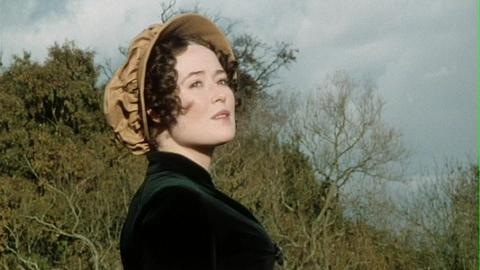
I did manage a sunlit wood she walked in during the middle of Part 3, the trees as she looked up (a still like this opens the recent 2007 Mansfield Park):
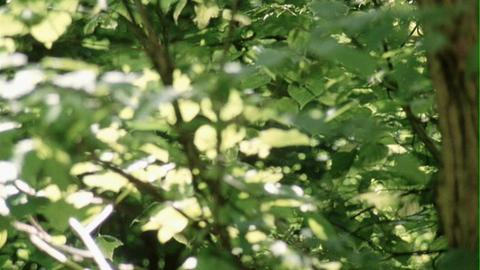
Here she is beneath, savouring the wind, sun, colors, moment:
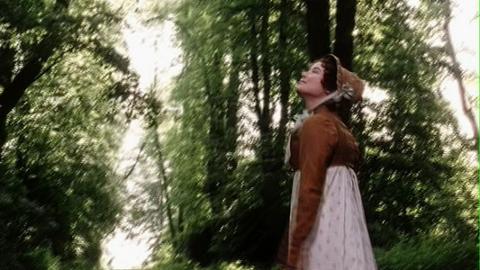
This film also creates again and again typical more formal 18th century landscape painting, as in this scene at Pemberley of Darcy, Elizabeth and Mr and Mrs Gardener before they set off on their first walk together deep into the grounds:
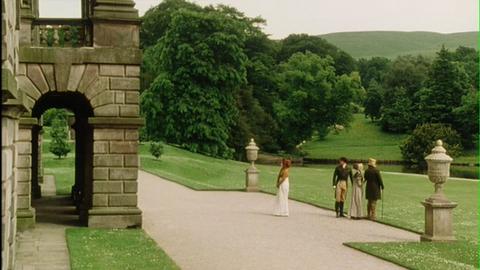
Ah who can deny the draw of these? Not I. Nor would I want to.
Were anyone to answer this letter who doesn’t like costume dramas of older high-status English novels, I might be told they attracts only those who can identify, feel comfortable in such settings. I can—in my imagination, for if it were reality I would probably be uncomfortable, not be able to experience the place like this except as a tourist, an outsider come to visit to take in the beauties and dream. From the book on Jane Austen and Bath that I began but never wrote:
I cannot recall exactly when I first read Northanger Abbey and conceived a desire to stand on top of Beechen Cliff so that, like Catherine Morland, I could reject “the whole city of Bath, as unworthy to make part of a landscape” (Ch 14) This desire or dream had been of the ironic kind, one intrinsic to Austen’s comedy. My playful yearning to re-enact Catherine Morland’s moment came from a persuasion I had that it was most improbable I would ever get the chance. In Austen there is always this sly insinuation that the comically idyllic moment of a novel is so satisying because it is beyond our ken. As her narrator tells us early in Sense and Sensibility, “the sanguine expectation of happiness . . . is happiness itself” (Ch 3). The dreams her texts invite us to wish for can sweeten life only if we do not desire them too strongly.
Were I really to find myself at a Pemberley like Elizabeth in the 1995 film I would be uncomfortable and anxious if the people who owned it (Darcy, of a higher class) came upon me unexpectedly, and be anxious to apologize for my presence. It’s a moment of delicate tact in Andrew Davies to have Colin Firth say “do not make yourself uneasy” and do all he can to assure her of her welcome.
--
Posted by: Ellen
* * *
Comment
- A few more from Wompo:
“Spy Girls” (Yes, written in the tradition of Bond Girls, The Avengers, Alias, etc.)
http://writersalmanac.publicradio.org/programs/2006/06/12/#friday
oem: "Spy Girls" by Jeannine Hall Gailey from Becoming the Villainess. © Steel Toe Books. Reprinted with permission. (buy now)
Spy Girls
always get their fiancés killed
in the very first scene.
A femme fatale can't also be
a loving wife and mother.
So she becomes a workaholic
to get over Steve, Jeff, or Lance,
sliding down elevator chutes
cutting through plate glass windows
carefully cracking the codes of illegal governments
dressed in formfitting rubber suits and blue wigs,
Temporarily blinded with acid spray
and shot through a shoulder and thigh,
she still manages to somersault over the wall
to grab the bars of the helicopter
just as it lifts off
secrets of nuclear fission in a disk
tucked in her lace-up boots,
keeping the world safe
from people just like her.
At night, she dreams of rescue,
of blending in with the crowd
of being one more girl
who eats ice cream for dinner
whose purse is not full of explosives.
“Femme Fatale”
http://www.versedaily.org/2006/femmefatale.shtml
Even our names sound delicious:
Pandora, Delilah, Bathsheba, Lola, GildaThey speak of us in the language of pastries—
cream puff, tart, cupcakeThey drool over us, put their hands in our bodies
Oh honey, Oh sugar
as if plunging into layers of white meringueWe dissolve behind veils and trench coats
our faces soon dimming
the whiskey of their tongues already forgottenAround us the scent of orchids and tobacco flowers
bruised and senescent
blooms into the night air, thick with gunfire“Becoming the Villainess”
http://www.endicott-studio.com/cofhs/chVillainess.html
A girl — lovelocked, alone — wanders into a forest
where lions and wolves lie in wait.
The girl feeds them caramels from the pockets of her paper dress.
They follow like dogs.
Each day she weaves for twelve brothers, twelve golden shirts
twelve pairs of slippers, twelve sets of golden mail.
She sleeps under olive trees, praying for rescue.
In her dreams doves fly in circles, crying out her name.
For a hundred years she is turned into a golden bird,
hung in a cage in a witch's castle. Her brothers
are all turned to stone. She cannot save them,
no matter how many witches she burns.
She weeps tears that cannot be heard
but turn to rubies when they hit the ground.
She lifted her hand against the light
and it became a feathered wing.
She learns the songs of mockingbirds, parakeets, pheasants.
She wanders into the forest more herself.
She speaks of her twelve stone brothers.
There is a dragon curled around eggs. There is a princess
who is also a white cat, and a tiny dog
she carries in a walnut shell.
She befriends a reindeer who speaks wisdom.
They are all in her corner. It seems unlikely now
that she will ever return home, remember what
it was like, her mother and father, the promises.
She will adopt a new costume,
set up shop in a witch's castle,
perhaps lure young princes and princesses
to herself, to cure what ails her —
her loneliness, her grandeur,
the way her heart has become a stone.
“She Escapes the Film Noir”
I slip out the door,
wearing a raincoat as disguise.
It might have wrinkles, indicating a recent tryst.
Also, I may wear a fedora.
I will certainly have a lot of hair
falling over the brim of my eyelashes, either because
I’m too busy to cut it
or I don’t want anyone looking me in the eyes.
Ominous footsteps echo in an unseen room,
along with distant thunder.
We are unsure of the dialogue in this script.
You watch me lean into the wet, shining street
and peer, nervous, into shadows.
Am I looking for you?
Or the man with a gun?
Either way, I’m holding tickets to Paris.
Care to join me?
I would light a cigarette
except for the damn rain. My lipstick
in this lighting is darker than blood,
and my hands won’t stop shaking.
Hope this is helpful! These are all from my first book :)
A fun topic to discuss!
Take care, Jeannine Gailey"
— Elinor Jun 8, 2:17pm # - Thank you for putting up the Peter Faulkner poem and finding the evocative Peter Wimsey pictures – it hadn’t struck me but yes, the mood fits very well.
I like Jeannine Gailey’s poems, especially ‘She Escapes the Film Noir’.
I agree this is a fascinating subject – it seems to me as if there must be poems somewhere about costume dramas, the more I think about it.:)
— Judy Jun 8, 5:04pm # - I should have added, thank you also for telling me what a Pierce Arrow is. I’d never heard of it – it’s a wonderful name for a car. Sounds almost like a film star name in itself.
— Judy Jun 8, 5:06pm # - Dear Judy,
I thought I’d add that of the poems I put in the comments I liked “Becoming a Villainess:” it seemed to me to have larger reach and be about women alone—the image where her heart ends up as stone reminded me of the ending of Mary Wortley Montagu’s “Lover” (the one about the joy of meeting over chicken and champagne ends on a line which alludes to why women turn to stone—in Ovid and elsewhere).
Thank you for citing another anthology: Philip French, The Faber Book of Movie Verse. I looked and it's 555 pages. Surely there will be poems on costume drama and women's films? We may hope for this anyway.
E.M.
— Elinor Jun 9, 12:59am # - From Jeanne Beaumont:
“Ellen,
There is the epic movie collaborative poem Phoebe 2002, by David Trinidad, Jeffery Conway and Lynn Crosbie that completely deconstructs and reconstructs the classic movie All About Eve. It’s full of movie lore, nearly every poetic form, and makes references to everyone from Pope to Sexton. Quite a wild read (Turtle Point Press, a huge book and with photos!). (Full disclosure: I blurbed it.) Lots of David Trinidad’s other poems are about the movies, and his forthcoming book is called The Late Show.
Another anthology of poems is Movieworks: Stories and Poems about Movies, edited by John W. Blanpied (the Little Theater Press, Rochester NY, 1990).
I know the Swenson James Bond poem in the “shaped” version published in her book Iconographs, which is worth checking out.
There are anthologies on Marilyn Monroe as well as James Dean (Mondo Marilyn and Mondo Dean) out from St. Martin’s Press.
Some other movie poems:
“Matinee” by Susan Wood in Campo Santo (it’s about To Catch a Thief), “Watching Bergman Films with My Father” by Joe Bolton (in The Last Nostalgia, U. Ark.)
“Seeing L’Atalante” (directed by Jean Vigo 1934), by Jean Valentine in Ordinary Things (FS&G)
That’s just a start. For a while I was collecting poems based on Hitchcock films, but I can’t seem to find those at the moment. I know Connie Deanovitch had one…
There are many, to say the obvious!
Jeanne Marie”
— Elinor Jun 10, 9:28pm # - Among the citations of about 4 different collections of movie verse, I bought one inexpensive volume and for today put on this blog, Margaret Atwood’s
“Werewolf Movies”
Men who imagine themselves covered with fur and sprouting
fangs, why do they do that? Padding among wet
moonstruck treetrunks crouched on all fours, sniffing
the mulch of sodden leaves, or knuckling
their brambly way, arms dangling like outsized
pajamas, hair all over them, noses and lips
sucked back into their faces, nothing left of their kindly
smiles but yellow eyes and a muzzle. This gives them
pleasure, they think they’d be
more animal. Could then freely growl, and tackle
women carrying groceries, opening
their doors with keys. Freedom would be
bared ankles, the din of tearing: rubber, cloth,
whatever. Getting down to basics. Peel, they say
to strippers, meaning: take off the skin.
A guzzle of flesh
dogfood, ears in the bowl. But
no animal does that: couple and kill,
or kill first: rip up its egg, its future.
No animal eats its mate’s throat, except
spiders and certain insects, when it’s the protein
male who’s gobbled. Why do they have this dream then?
Dress-ups for boys, some last escape
from having to be lawyers? Or a
rebellion against the mute
resistance of objects: reproach of the
pillowcase big with pillow, the tea-
cosy swollen with its warm
pot, not soft as it looks but hard
as it feels, round tummies of saved string in the top
drawer tethering them down. What joy, to smash the
tyranny of the doorknob, sink your teeth
into the inert defiant eiderdown with matching
spring-print queensized sheets and listen to her
scream. Surrender.
************
Powerful sardonic exposure of the impulses underlying this unhappily
popular archetype, no? I say popular because, for example, I’m nowpersuaded that the Dr Jekyll and Mr Hyde story is a werewolf
story. Hyde is a variant on the werewolf: his intense brutality,
hairiness, animal like nature, the refusal of the narrator in the
original (and consequent) stories to describe his face.
As with most vampire stories (not all), it’s fiercely, and in this
case ferociously filled with violence aimed at women.
E.M.
— Elinor Jun 20, 10:16pm # - Fran wrote:
”’As with most vampire stories (not all), it’s fiercely, and in this case ferociously filled with violence aimed at women.’
Thank you for the Atwood poem, Ellen, it’s not one I’ve come across before.
I found it just after seeing off a couple of friends from a study group this morning and one of them had a particular shocking story of male violence to tell: a friend of her daughter’s from college was out discoing recently and ended up dancing and necking with a previously unknown, but charming young man who then wanted her to go home with him: she refused – fortunately. She then had a violent allergic reaction in the night and had to be taken to hospital, where her doctor established that she’d reacted to cadaveric poison and she’s not studying medicine. The police were notified, they managed to locate the young man in question and found three dead women in his apartment – he’s proved to be a serial killer & mecrophiliac. It makes you worry even more about your kids out there with these sick, modern-day predators ......
Fran”
To which I replied:
Dear Fran,
It’s a great poem. Atwood knows what these movies are about.
I learned when I was younger that it’s very dangerous to go to the house of anyone who you have never met before. The problem with Nuala O’Faolain’s depiction of her heroine’s adventures in promiscuity is she erases the probable violence and insults her heroine must have known had she behaved the way O’Faolain imagined. You do see this in Emma Donoghue’s Slammerkin: Mary’s best friend Doll ends up sick, exhausted, beaten and then dead pretty quickly.
E.M.
— Elinor Jun 20, 10:24pm # - From Judy:
“Thank you to Ellen for posting Atwood’s ‘Werewolf Movies’, which I think does startlingly bring out the violence in these movies – and in these sorts of imaginings.
I’ve been meaning to say that I managed to borrow The Faber Book of Movie Verse, edited by Philip French and Kenneth Wlaschin, from my local library. So far I’ve just really dipped in and tried to get a general flavour of it, but I must say my reaction is mainly isappointment – it does seem very male in its version of the movies, somehow. There aren’t all that many poems by women, and most of those about women tend to be just about the great stars like Monroe and Garbo – very little about costume dramas.
Having said that, there are many good poems in there, of course, and I will probably discover more of these. I thought I’d post this poem by Fiona Pitt-Kethley, who has several poems included in the book, drawn from her experience of working as a film extra. This one is another take on movie violence against women.
Bond Girl
Back in my extra days, someone once swore
she’d seen me in the latest James Bond film.
I tried to tell her that they only hired
the really glamorous leggy types for that.
(My usual casting was ‘a passer-by’.)
I’ve passed the lot in Pinewood Studios.
It’s factory-like, grey aluminium, vast
and always closed. Presumably that’s where
they smash up all the speedboats, cars and bikes
we jealous viewers never could afford.
I quite enjoyed the books. Ian Fleming wrote well.
I could identify a touch with Bond,
liking to have adventure in my life.
The girls were something else. All that they earned
for being perfect samples of their kind
Black, Asian, white – blonde, redhead or brunette,
groomed, beauty-parloured, pleasing in bed,
mixing Martinis that were shaken not stirred,
using pearl varnish on their nails not red
was death. A night (or 2) with 007,
then they were gilded till they could not breathe,
chucked to the sharks, shot, tortured, carried off
or found, floating face downward in a pool.
Fiona Pitt-Kethley"
— Elinor Jun 22, 11:19pm #
commenting closed for this article
